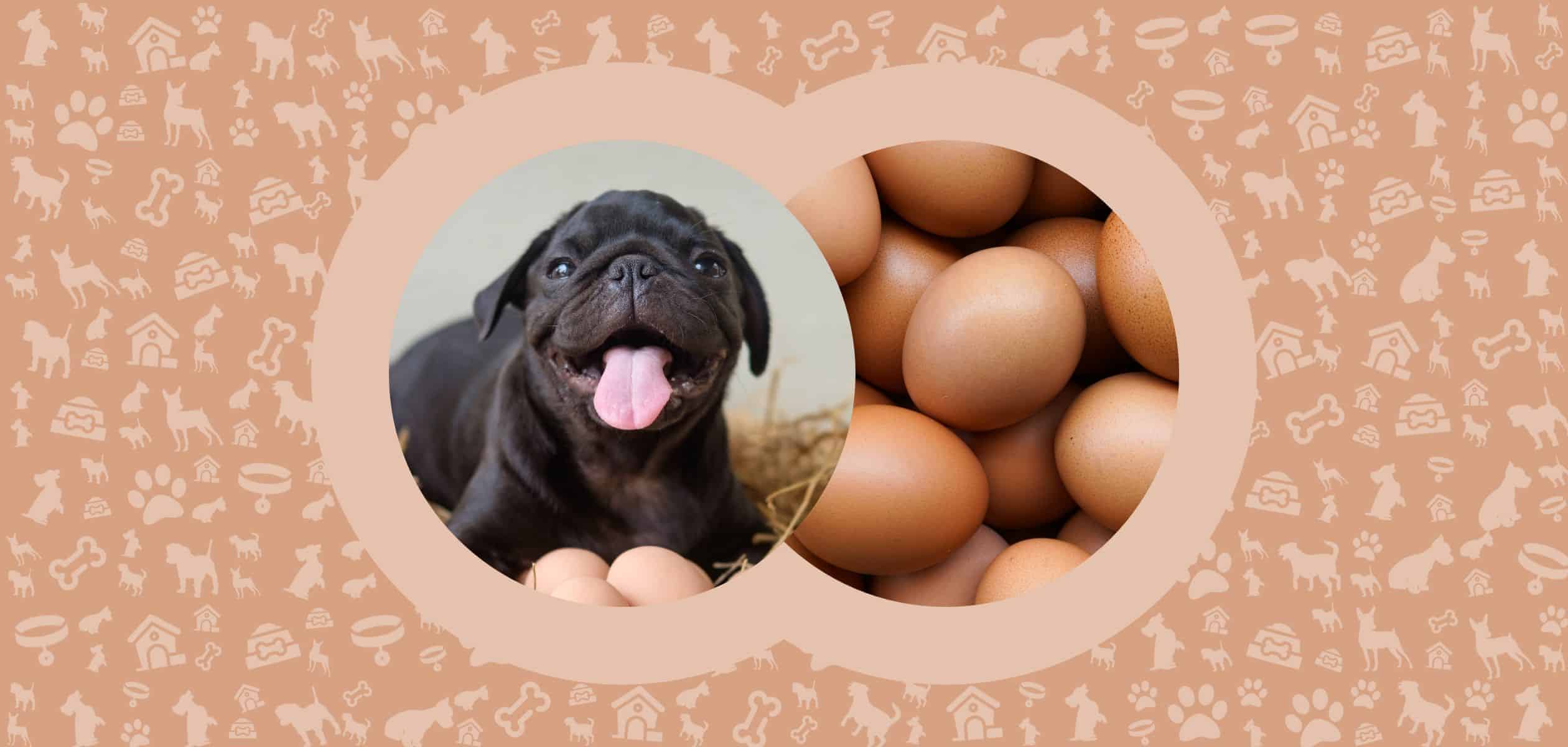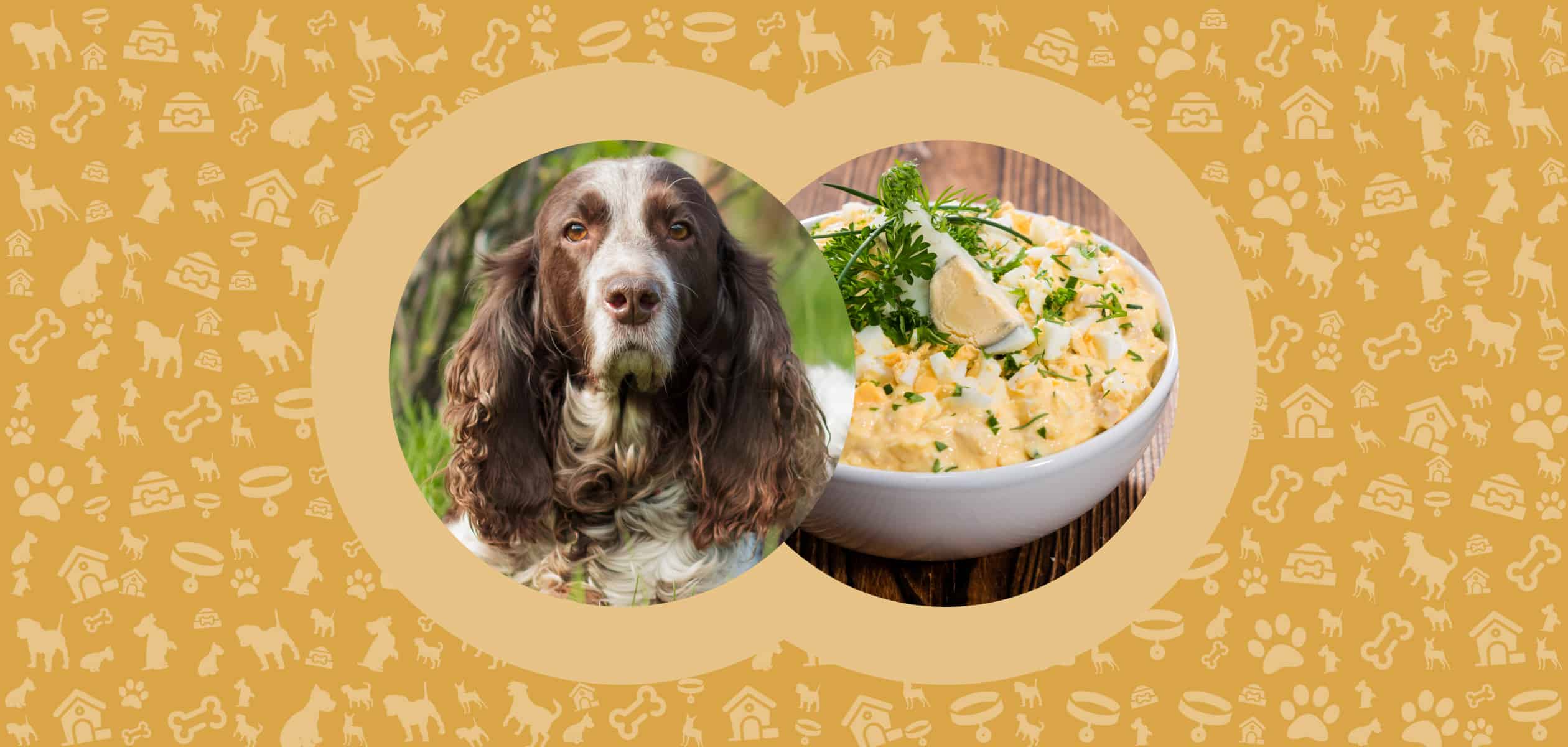Introduction
Eggs contain a variety of nutrients ranging from vitamin A and vitamin B12 to protein, fatty acids, as well as selenium and iron. But can dogs eat eggs?
We’re answering this question in today’s article. But if you need a quick answer, here’s one: eggs are entirely safe for dogs so long as they are looked at as a treat and not their main food.
Do not feed eggs instead of dog food as they are rich in cholesterol and could cause liver health issues. However, adding eggs to dog food every once in a while is perfectly safe.
Free-range hens that are fed an excellent diet lay the best eggs. Some dogs might experience mild digestive distress when eating this food for the first time.
Are eggs good for dogs?
Protein and fatty acids
Since dogs share a lot of their genetic material with wolves and other canine predators, they tend to thrive when being fed a diet rich in protein and fats, not carbohydrates.
Eggs make a great meat substitute and they’re also rich in fatty acids, which can have a positive impact on your dog’s skin and coat.
Will eggs help my dog gain weight? Yes. A boiled egg has as many as 155 calories. The vast majority of dogs need about 20 to 30 calories per pound per day to maintain their weight. If your dog weighs in at 10 pounds, a boiled egg can supply them with half of their daily caloric intake.

Amino acids
Surprisingly enough, egg whites are quite rich in a variety of amino acids, such as the following:
- Arginine
- Leucine
- Lysine
- Methionine
- Tryptophan
- Phenylalanine
Eggs also contain histidine, isoleucine, as well as threonine. While all of these amino acids do different things, some of the benefits that your pet can enjoy from eating an egg every once in a while can range from excellent bone health and an increase in muscle mass to a decrease in blood pressure.
Vitamins
Since they are so protein-packed, eggs aren’t as rich in vitamins as vegetables or fruits might be. However, they still contain some, and the most important ones are vitamins D, B6, and B12.
Each of them has a number of benefits. For example, vitamin D is extremely important for building bone mass and preventing diseases such as rickets and osteoporosis.
Vitamin B6 helps your dog develop a strong immune system, which effectively means that your pet is going to be better protected against infections they might get after coming in contact with other dogs.
As for vitamin B12, it is involved in a number of processes happening inside your dog’s body. For example, it prevents anemia, but it also keeps your dog’s central nervous system healthy.
Minerals
Eggs are rich in zinc, copper, selenium, and iron. Let’s see what all of these minerals can do for your dog. Iron is essential for healthy body development so it is particularly important for puppies.
Copper can provide your pet with many benefits, such as keeping their nerve cells healthy, protecting their cells from damage, turning glucose into energy, and producing red blood cells. It is also great for keeping your pet’s immune system up to par and it aids in the formation of collagen, a protein that’s an essential component of all bones, joints, and tissues.
Are eggs bad for dogs?
Eggs should be looked at as a treat as feeding too many and on a regular basis to dogs can create some problems. Here are the most significant risks you are exposing your pet to when giving them eggs, especially raw ones.
Bacterial contamination
This is the biggest issue with feeding eggs to dogs. If you do not boil them enough or if you feed them in their raw form, you’re risking your dog suffering from indigestion or worse, food poisoning.
As you probably know, many eggs are contaminated with bacteria such as Salmonella spp., which is a pathogen that regularly causes food poisoning in people. While the inside of the egg might be safe, the shell always risks carrying germs since it comes in direct contact with the bird’s feces.
Dogs can develop Salmonellosis just like humans do. Some of the symptoms of this health issue range from vomiting and diarrhea to fever and lethargy. If you see your pet exhibiting any of these clinical signs, go to the vet hospital as soon as possible — dehydration is a life-threatening health problem.
Biotin deficiency
Egg whites contain avidin, an enzyme that inhibits the absorption of biotin in your dog’s body. While biotin deficiency as a consequence of feeding eggs to dogs is quite rare, especially since most pet parents don’t tend to overdo it, it can still happen, especially in large breeds that grow fast.
If your dog has biotin deficiency, they will show symptoms mostly relating to their coat health — crusty or dry skin, loss of fur, or a brittle coat.
Food intolerances
You can’t know for sure whether your dog has an egg allergy or not. Some pets can have an allergy to egg yolks while others can have an allergy to egg whites. The symptoms vary a lot from one animal to another and also depend on how their general health is.
Even if your dog is allergic to eggs but they are otherwise completely healthy, they might experience a mild nuisance such as gas, vomiting, or a bout of diarrhea or even itchy skin or an ear infection.
Fortunately, cases where dogs have had an anaphylactic shock as a result of eating an egg are quite uncommon.
How many eggs can a dog eat?
How many eggs can a dog eat in a day? Well, the problem shouldn’t be looked at in this way. In fact, dogs can vary a lot in terms of their size and even their health depending on various factors, including their age.
While some argue that feeding your dog an egg per day is completely safe, if you have a Chihuahua, 1/4 to 1/3 of an egg might be safer. A large or giant dog breed, by comparison, can safely eat an egg once a day or every two days.
Do not forget that eggs are quite rich in cholesterol, so they can aggravate liver or fat metabolism issues especially in senior dogs.
If you want to be on the safe side of things, do not feed your dog more than 2 eggs per week.
Frequently Asked Questions
Egg allergies are less common in dogs, but they can happen. For example, pets that already have a history of food intolerances and allergies are more likely to develop an egg allergy if this is an alternative protein source that pet parents have to try in the absence of other choices.
Most vets recommend switching to other types of protein. For example, if a dog is allergic to chicken, they might have to eat fish or lamb. But the point is that the diet has to be diversified so as to prevent food allergies, including eggs.
It depends on your pet’s specific health status. If your veterinarian advises against it, do not feed your dog eggs. Are eggs absolutely essential to dogs? The truth is that they are not.
These days’ pet diets are quite rich in nutrients and if you pay attention to their ingredients and even make your own homemade dog food and snacks, you don’t have to give your pet eggs.
No. If you make the mistake of feeding your dog scrambled eggs or any fried eggs of any kind, you risk causing them pancreatitis. Eggs are rich in cholesterol enough — if they are fried, they can be extremely dangerous, especially to a small dog breed.
Dogs that have high cholesterol shouldn’t be given this food, either. On the other hand, they should be fed diets composed of lean meats, veggies, and foods like pumpkin for a healthy dose of fiber, for example.
Yes. However, feeding puppy eggs that are raw is extremely risky, which is why we always suggest giving them hard-boiled ones only. Their mothers can also benefit from this snack every now and then although feeding puppies eggs (at least one a week) can guarantee that they grow up and become healthy adults.
When cooking eggs for puppies, make sure you never use any condiments, seasonings, or spices and never add salt, garlic, or onion to the dish.
Yes. In fact, many farmers have a problem in that their dogs can’t refrain from stealing and eating their hens’ eggs. But chicken eggs are generally safer than those of other species as when they are washed properly, they tend to have less risk of carrying Salmonella and other bacteria.
Yes. What’s even more surprising is that duck eggs can have even more benefits as they contain omega-3 fatty acids, as well as more vitamins compared to chicken eggs — vitamins A, B1, B2, B5, and B9. They also contain phosphorus, which besides calcium, is essential for puppies.
On the other hand, duck eggs have more fat and cholesterol compared to chicken eggs, so they shouldn’t be given to pets that have pancreatitis or fat metabolism issues. Plus, they have to be boiled properly as the risk of bacterial contamination is higher.
How to cook eggs for dogs
The safest way of cooking eggs for dogs, whether adults, puppies, or pregnant bitches, is to hard boil them. Then chop them up until they are easy to munch on and feed them immediately.
While some people might argue that raw eggs contain more nutrients compared to their hard-boiled counterparts, the truth is that the risks are so many that it just doesn’t make sense for you to put your dog’s health in jeopardy.

How to serve
Are egg shells good for dogs?
Using eggshells for dogs in order to supply them with a bit of calcium is a great idea. You can use the shells of hard-boiled eggs you’ve already eaten, but you have to properly grind them. They should be turned into a powder in order for eggshells in dog food to pose no choking risk.
Can dogs eat raw eggs?
Many pet parents use raw eggs for dogs’ itchy skin or for generally improving their coat health. But the truth is that cooked eggs can provide your dog with the same benefits and there are also no risks involved.
If your vet clearly recommends against giving your dog raw eggs, we suggest steering clear of them. Also, if your dog ate raw egg, pay attention to their behavior for several hours to see whether they develop some digestive distress. If they do, take them to the emergency pet hospital.
Can dogs eat hard boiled eggs?
Hard boiled eggs for dogs are the best as they are perfectly safe and due to the high water temperature they are cooked in, all of the bacteria is decimated — so your dog doesn’t risk getting food poisoning.
Can dogs eat egg yolk?
Yes, but you do have to consider that the ‘lightest’ component in an egg is the egg white, not the yolk. If your dog is on a diet and shouldn’t eat a lot of fat, avoid feeding them the yolk and give them the egg white, instead.
Can dogs eat scrambled eggs?
There is no version of scrambled eggs for dogs that’s considered to be safe. While cooking eggs eliminates the risk of your dog developing Salmonellosis, frying them in oil or butter can cause other problems, such as pancreatitis, high cholesterol, or digestive distress.
The mildest symptom that your dog can experience if you feed them scrambled eggs is diarrhea and gas — and that’s the mildest one.
Best Practices and Restrictions
Avoid feeding raw eggs to all dogs, in general, but especially to seniors, puppies, and pregnant dogs. These categories are extremely vulnerable and might develop health complications as their immune system does not function the same as that of a healthy adult dog.
Pregnant dogs can even transmit the infection to the unborn puppies, resulting in a miscarriage. They could also be born with certain deficiencies, especially if the dog has to receive treatment with antibiotics despite her physiological status.
Summary
Eggs are a great source of protein, fat, amino acids, vitamins, and minerals. Dogs can safely eat eggs, so long as they are hard-boiled. They should not be seasoned in any way and they should be given to dogs right after being cooked or stored in the refrigerator until their mealtime.
If you have any doubts whatsoever about giving your dog eggs as a snack, talk to your veterinarian beforehand.
Sources
- Canine Salmonellosis: A review and report of dog to child transmission of Salmonella enteritidis, 1976, E V Morse, M A Duncan, D A Estep, W A Riggs, B O Blackburn



Leave a Comment